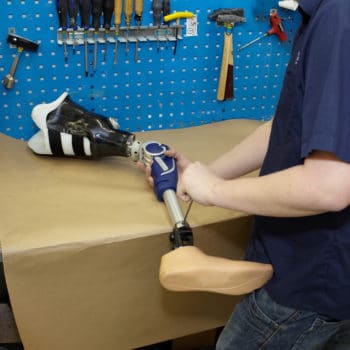Why We Love It
-
$52,850Potential Avg. Salary
-
27.1%Job Growth Rate
-
Growing DemandJob Outlook
-
Dependable Daily WorkloadCareer Attribute
A hearing aid specialist, is a skilled professional that assesses individuals facing hearing problems and provides them with immediate solutions like hearing aids, to improve their condition.
Recommended Schools
What is a Hearing Specialist?
Duties
Hearing specialists have the following functions:
- Select and perform preliminary hearing tests and procedures such as speech audiometry tests, otoacoustic screening, Tympanometry, ETD testing ear canal screening, pure tone screening, bone conduction, air conduction, etc.
- Work closely with patients and other professionals from varied backgrounds, e.g. speech pathologists, school specialists, children, adults, to promote optimum hearing and development.
- Focus on continuous learning for professional development by taking up educational opportunities on latest products and techniques, and keeping track of professional publications.
- Provide counsel and recommendations to patients suffering from hearing or related disabilities, for accurate hearing aids.
Day In The Life
As a hearing specialist, you will be able to help a wide range of people who suffer from loss of hearing caused by age and illness. For this reason, having excellent interpersonal skills to promote effective working relationships with clients, colleagues, and vendors is vital. You will evaluate each case carefully to determine which hearing aid works best for the individual. Common hearing tests you might utilize includes an audiogram and speech audiometry, which helps to assess the degree of hearing loss in both patient’s ears.
Other day to day work may include fitting, ear-mold acoustics with ongoing management like follow-ups; replacing defective parts of hearing amplification systems or making repairs to them when brought in by a patient; training patients to use hearing aids correctly; providing support to audiologists when they execute aural processes like auditory brainstem responses and cochlear implant mapping.
Work Schedule
As a hearing specialist, you would be working in a standard office environment where you will meet with people to provide quality hearing aid services to people suffering from hearing loss. Work can span up to 40 hours per week, with predictable workload as these services are not required on an emergency basis unless in special circumstances. You will be working regularly with various testing equipment and evaluating different types of hearing aids for a patient’s selection. You may occasionally have to travel between different practices. This position also requires frequent hand movements and fine manipulation.
Growth Of The Job
This industry is experiencing tremendous growth in the current market, leading to a high demand in providers. According to the Bureau of Labor Statistics, the profession is projected to grow at 27 percent, between 2014-2024, leading to 1600 new jobs. There are strong projections of job opportunities for hearing specialists. With an aging population, hearing devices and knowledgeable hearing aid specialists are crucial to address common hearing loss issues. Further, workers in careers such as manufacturing industries experience sound pollution, which leads to hearing problems in the long run and a need for hearing aids in the future.
Typical Employers
Hearing specialists and related experts in the field, work with employers such as social services, hearing and speech agencies, medical hospitals and clinics, government institutions, academic institutions such as schools and colleges. Employers value candidates possessing strong business communications skills and able to work independently with the will to succeed.
Recommended Schools
How To Become a Hearing Specialist
There are two major ways via which aspiring applicants can embark on their career as a hearing specialist. The first method is to complete an academic qualification like a degree in hearing instrument fitting. A two-year technical degree is provided by many leading community colleges. You may choose to complete an associate’s degree in Early Childhood Education or a bachelor’s degree in American Sign Language. Alternatively, you may also get practical training while finishing up a distance learning course from an accredited hearing society. Distance learning programs combine applied experience via mentors as well as essential theoretical concepts, to equip professionals with the key requirements to qualify for state licensing and practice as hearing specialists.
Your coursework while studying to become a hearing specialist, should focus on subjects like math and science, audiology, hearing aid development and human anatomy, especially of the year. With advanced technology making progress in the hearing care industry, one must be well-versed with technical skills and be willing to adapt overtime. Cultivate qualities like attentiveness, confidence and empathy to work seamlessly with customers during interactions. As a care provider, it is up to the hearing specialist to closely understand the patient’s questions and establish trust with them.
Hearing Specialist Salary Data
We’ve provided you the following to learn more about this career. The salary and growth data on this page comes from recently published Bureau of Labor Statistics data while the recommendations and editorial content are based on our research.
National Anual Salary
Low Range
$34,620Average
$52,850High Range
$79,400National Hourly Wage
Low Range
$17/hrAverage
$25/hrHigh Range
$38/hrHow do Hearing Specialist salaries stack up to other jobs across the country? Based on the latest jobs data nationwide, Hearing Specialist's can make an average annual salary of $52,850, or $25 per hour. This makes it an Above Average Salary. On the lower end, they can make $34,620 or $17 per hour, perhaps when just starting out or based on the state you live in.
Salary Rankings And Facts
#356 Nationally for All Careers
Programs and Degrees
Here are the most common degrees for becoming a Hearing Specialist. a is usually recommended and specifically a degree or coursework that prepares you for the particular field, see below.
Highest Education Among Hearing Specialists
- 4.8% Doctorate
- 7.5% Masters
- 21.3% Bachelors
- 14.4% Associates
- 31% College
- 19.3% High School
- 1.7% Less than High School
Job Growth Projections and Forecast
2014 Total Jobs
5,9002024 Est. Jobs
7,500Job Growth Rate
27.1%Est. New Jobs
1,600How does Hearing Specialist job growth stack up to other jobs across the country? By 2024, there will be a change of 1,600 jobs for a total of 7,500 people employed in the career nationwide. This is a 27.1% change in growth over the next ten years, giving the career a growth rate nationwide of Below Average.
Growth Rankings And Facts
#19 Nationally for All Careers
What Companies Employ The Most Hearing Specialists
| Industry | Current Jobs | New Jobs Needed | % Increase |
|---|---|---|---|
| Other general merchandise stores | 1,000 | 400 | 0% |
| Offices of physical, occupational and speech therapists, and audiologists | 900 | 500 | 1% |
| Offices of physicians | 700 | 100 | 0% |














